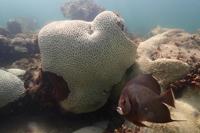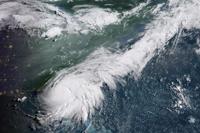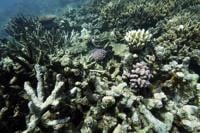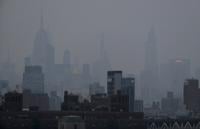Coral reefs around the world are experiencing global bleaching for the fourth time, top reef scientists declared Monday, a result of warming ocean waters amid human-caused climate change.
Coral reef bleaching across at least 53 countries, territories or local economies has been confirmed from February 2023 to now, scientists from the ������ϲʹ������� Oceanic and Atmospheric Administration and International Coral Reef Initiative said. It happens when stressed coral expel the and give them their color. If the bleaching is severe and long-lasting, the coral can die.
Coral reefs are important ecosystems that sustain underwater life, protect biodiversity and slow erosion. They also support local economies through tourism.
Bleaching has been happening in various regions for some time. In the world's largest coral reef ecosystem, , bleaching affected 90% of the coral assessed in 2022. The , the third-largest, experienced significant bleaching last year.
But in order for bleaching to be declared on a global scale, significant bleaching had to be documented within each of the major ocean basins, including the Atlantic, Pacific, and Indian oceans, in both the Northern and Southern Hemispheres.
Monday's news marks the second worldwide bleaching event in the last 10 years. The last one ended in May 2017. Brought on by a , it and was determined to be .
This year's bleaching follows the declaration that .
“As the world’s oceans continue to warm, coral bleaching is becoming more frequent and severe,” Derek Manzello, NOAA Coral Reef Watch coordinator, said in a statement.
Selina Stead, a marine biologist and chief executive of the Australian Institute of Marine Science, called climate change “the biggest threat to coral reefs worldwide.” She said scientists are working to learn more about how coral responds to heat and to identify naturally heat-tolerant corals, but said it is “critical the world works to reduce carbon emissions.”
One reef that fared better than others last year was the , which was afforded some protection by its location in deeper water in the Gulf of Mexico about 100 miles off the Texas coast. Sanctuary officials didn't immediately respond to messages Monday seeking the latest on the health of the sanctuary's corals.
___
Alexa St. John is an Associated Press climate solutions reporter. Follow her on X, formerly Twitter, . Reach her at ast.john@ap.org.
___
The Associated Press’ climate and environmental coverage receives financial support from multiple private foundations. AP is solely responsible for all content. Find AP’s for working with philanthropies, a list of supporters and funded coverage areas at .








































